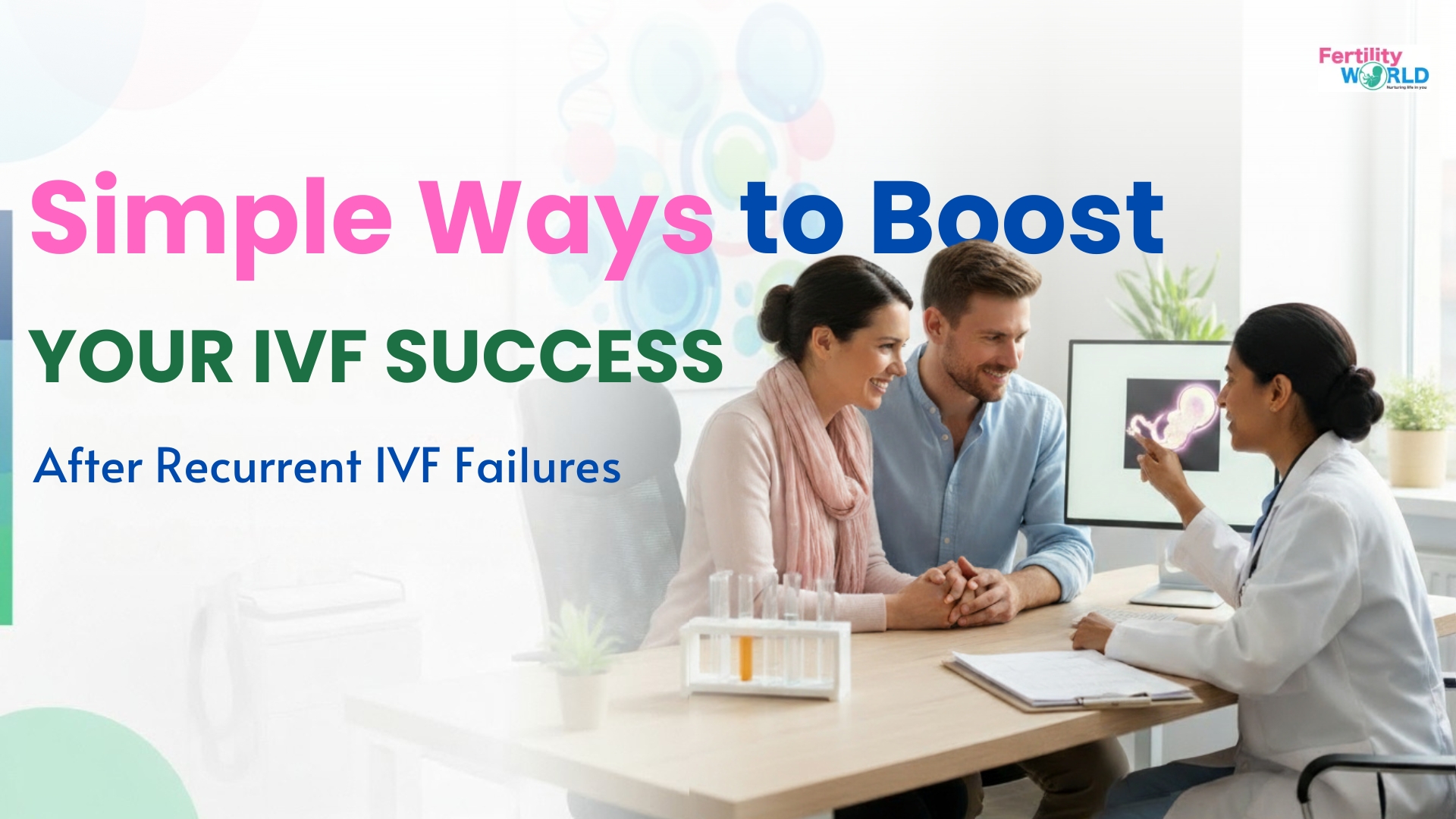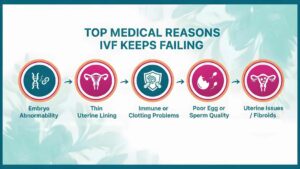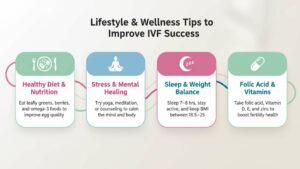It’s normal to feel tired and question everything after multiple failed IVF attempts, but please know that your story isn’t over. A few small changes to your method, way of life, or medical plan can sometimes make a big difference in how well your IVF works. It’s okay, you don’t have to figure it out by yourself. We’re here to help you find a cycle that finally works in your favour.
Sign up for a free appointment, and we’ll help you plan your next IVF cycle that works:
Call +91 9311850412 or email info@fertilityworld.in.
Why IVF Fails Repeatedly and How to Identify the Root Cause
It’s normal to ask, “Why does my IVF keep failing?” when it doesn’t work after one or more tries or “What should I do if IVF fails twice?” These questions start from hope and the need to know what’s truly going on. The truth is that your journey doesn’t end with IVF failure. A lot of the time, it means you need to look at something more deeply. We employ advanced diagnostic technologies and skilled treatment at Fertility world to find out what really went wrong with IVF. This could be anything from the quality of the embryos and the balance of hormones to the health of the uterus or the immune system.
Every cycle gives us important information about your body. Finding out what is causing recurring implantation failure can help us make a more personalized plan that will give you a better chance in the future round.
What Recurrent IVF Failures Means Medically
It can feel emotionally draining and confusing when IVF fails more than once. When two or more embryo transfers do not result in a pregnancy, even when the embryos appear healthy, then medically this is called Recurrent IVF Failures or Repeated Implantation Failure (RIF).
This doesn’t mean your body can’t get pregnant; it just means that there is a connection between the embryo and the uterus that has to be looked at more closely. It depends on two important things for implantation to work: the embryo must be strong and genetically healthy, and a receptive uterine lining must be ready to support it.
At Fertility world, we make a personalised plan to help your next cycle’s implantation go better by figuring out the main problem. The first step to make IVF work is to figure out why IVF fails.
Recurrent IVF Failure (RIF) occurs when two or more embryo transfers are unsuccessful owing to difficulties with the embryo, uterus, or hormones that block implantation.
Common Medical Causes of Recurrent IVF Failure
| Cause | How It Affects IVF | Possible Solution |
|---|---|---|
| Embryo Abnormality | Chromosomal or genetic defects in embryos prevent implantation or early development. | Preimplantation Genetic Testing (PGT-A), blastocyst-stage transfer for stronger embryos. |
| Thin Uterine Lining | Reduces uterine receptivity and makes it harder for embryos to attach. | Hormonal therapy, Platelet-Rich Plasma (PRP) treatment, or ERA test to optimize timing. |
| Immune or Clotting Issues | Overactive immune response or blood clotting can block embryo attachment. | Heparin, low-dose aspirin, or immune-modulating medications under medical supervision. |
| Poor Egg or Sperm Quality | Leads to weak or non-viable embryos that fail to implant. | Use of ICSI, IMSI, or CoQ10 supplements to improve egg and sperm health. |
| Uterine Issues | Structural abnormalities like fibroids, polyps, or scar tissue interfere with implantation. | Hysteroscopy correction to restore a healthy uterine environment. |
Emotional and Lifestyle Factors That Impact IVF Success
Your daily routines and feelings might have a big effect on how well your body responds to IVF. A few small changes can make a big difference in your chances of IVF success..
- Stress and anxiety: High levels of stress can boost cortisol levels, which can mess with hormone balance and make it harder for an embryo implantation. You can try yoga or relax.
- Sleep and rest: Lack of sleep messes with hormones that affect fertility. Try to get 7 to 8 hours of sleep per day.
- Smoking & Alcohol: Both smoking and drinking can harm the quality of eggs and sperm. If you stop it early, it can make IVF work better.
- Nutrition: Eating balanced meals that are high in protein, fruits, and antioxidants will help your reproductive health.
- Emotional Support: You have to keep in touch with family and friends or IVF support groups. When you check your emotions, it will help your body heal.
We care for your body and heart both at Fertility World and also help you have a healthier, calmer, and more successful IVF journey.
Advanced Diagnostic and Medical Solutions After Multiple IVF Failures
If your IVF treatment hasn’t worked a few times, it doesn’t mean that you can’t get pregnant. That indicates that your body needs to be looked at more closely to figure out why IVF fails repeatedly. We use advanced IVF treatments and specific tests at Fertility world to figure out what went wrong and how to make your next IVF try work.
Optimize Embryo Selection with Modern Technology
Sometimes there are IVF failures since the embryos have genetic or chromosomal issues that aren’t obvious. We use PGT-A IVF (Preimplantation Genetic Testing) to screen embryos for any chromosomal problems before they are put in the uterus. This will prevent this from happening. We also nurture embryos in our lab till Day 5 (blastocyst culture) to choose the one that is healthiest. We can see the embryo grow in real time with time-lapse embryo culture and pick the strongest one to transplant.
Did you know? For women over 35, using PGT-A IVF can raise the success rate by 20–30%!
Assess and Improve Uterine Receptivity
Even a healthy embryo needs a uterus that is ready for it to grow. The ERA test in IVF (Endometrial Receptivity Analysis) assists in finding the exact time when your body is prepared to implant the embryo.
We also utilise hysteroscopy IVF to look for any fibroids, polyps, or adhesions in the uterus that could inhibit implantation. Thin lining IVF procedures, like PRP or hormone therapy, help make the lining soft, thick, and ready for the embryo if it is too thin.
Consider Advanced Immune and Blood Therapies
Sometimes, the immune system or blood flow in the body can change how an embryo implants. We can use gentle and effective therapies to fix that, like:
- PRP therapy IVF uses the healing cells in your own blood to make a better lining of the uterus.
- PBMC injection helps the immune system work better so that implantation goes more smoothly.
- Low doses of heparin or aspirin can help IVF work better by keeping the uterus healthy.
- When needed, treatment for antiphospholipid syndrome or an excess of NK cells.
- These IVF immune therapy choices help your body and embryo work together in a healthy way.
Lifestyle and Wellness Adjustments to Improve IVF Success
Have you ever thought about why doctors stress your lifestyle and daily habits before IVF?
In order to help you get pregnant, your body is more than just a machine. It’s a delicate system where your food, stress, sleep, and attitude all play a part.
Simple IVF lifestyle tips can increase your chances of having a successful IVF and even lower your chances of having an IVF failure. Let’s learn how little things can have a big effect.
Balanced Diet and Fertility Nutrition
Did you know that what you eat has a direct impact on the egg quality and overall fertility? A simple IVF diet can help a lot by giving your body the nutrients and strength it needs to help with treatment.
Leafy veggies, berries, whole grains, omega-3 fats, and lean proteins are good places to start. These foods help keep your hormones in check and promote healthy eggs and embryos. You can also take supplements like Omega-3 fatty acids, CoQ10, and Vitamin D to help with fertility. These are diet plan to improve IVF success which is full of vitamins that keep your cells from damage.
Eating well isn’t just about getting full; it’s also about keeping your dream of parenthood.
Stress Management and Mental Healing After IVF Failures
Can stress cause IVF failure? Stress doesn’t stop pregnancy by itself, but it can raise cortisol levels, throw off the balance of your hormones, and make the trip harder on an emotional level.
You can feel worried as IVF can be a lot to handle. But getting your mind to calm down is good for your body. If you’re going through IVF, try easy yoga, guided meditation, or talk therapy. These activities help you calm down and keep your emotions in check.
Sleep, Weight, and Lifestyle Discipline
During IVF, do you get enough sleep? You need to get 7–8 hours of good sleep every night, which helps your body heal and keeps your fertility factors in balance. You also need to maintain a good BMI (18.5–25), which is also important, since being too thin or too fat can change hormone balance and egg production.
Don’t drink or smoke, and do a lot of light exercise. Limit your caffeine intake to less than 200 mg per day. Small, regular changes to the way you live can make it easier for your IVF cycle to work.
Take Folic Acid and Multivitamin Support
Folic acid is sometimes called the “fertility vitamin.”
It keeps chromosomal problems from happening in the baby and helps cells grow in a healthy way. Taking multivitamins for fertility, like iron, zinc, Vitamin E, and Vitamin D, can help your eggs get better and your uterine lining get stronger.
Most people find that taking these IVF vitamins every day helps their bodies get ready for pregnancy naturally.
We at Fertility World, think that success isn’t just based on science, but also on taking care of yourself.
You give your IVF trip a better chance to go well if you combine advanced medical care with mindful living and small changes to your daily routine.
Reviewing Treatment and When to Seek a Second Opinion
Some people think, “What should I do next?” or “Should I change my IVF doctor?” after three or more failed transfers. Good news: A lot of couples can get better after going over their treatment plan again or taking a short break. A slight change in the IVF procedure or a second opinion from a different fertility expert can sometimes be all that is needed.
Review and Adjust Treatment Protocol
If your cycle doesn’t work, you should talk to your doctor about what went wrong. By going over the IVF procedure again, you can see what needs to be changed, like the drugs, the amount of hormones used, or the way the lab works.
List to follow after an unsuccessful IVF cycle:
- Look over your past IVF medication and how your eggs responded.
- Check the quality of the egg and think about PGT-A or blastocyst transfer.
- Check the health of the uterus and the thickness of the endometrium again.
- Talk about more complex tests, such as ERA or immunity testing.
When to Take a Break After IVF failures
Before you start another cycle, your body needs to rest. Taking a break from IVF for 4–6 weeks lets the hormones restart and the uterus heal properly. Taking a short break can also help you feel less stressed and get better results in your next cycle.
| Recommended Gap Between Cycles | Reason |
|---|---|
| 4–6 weeks | Hormone and uterine recovery |
| 2–3 months | Time for extra tests or health improvements |
When to Consider Donor or Alternative Options
If you’ve failed a lot, you might want to look into other options like donor egg IVF, donor sperm IVF, or surrogacy. A lot of the time, these treatments work better, especially for people who have problems with their uterus or low ovarian reserve.
If your cycle doesn’t work, you should talk to your doctor about what went wrong. By going over the IVF procedure again, you can see what needs to be changed, like the drugs, the amount of hormones used, or the way the lab works.
| Alternative Option | When It Helps | Success Rate (Approx.) |
|---|---|---|
| Donor Egg IVF | Low egg count or poor quality | 60–75% |
| Donor Sperm IVF | Male infertility or genetics | 50–70% |
| Surrogacy | Uterine or medical limitations | 70–80% |
Final Thoughts
Every time an IVF treatment fails, it can be very sad, but it’s not the end of the world. With the right care, patience, and hope, many couples who had recurrent IVF failures finally had success.
It’s not just science that goes into IVF; you also need to know your body, make some small changes, and try again with a new plan. The next round of IVF could be the one that makes your dream come true. We at Fertility World use cutting edge technology and gentle mental support to help you feel better about yourself and find hope after IVF failed. Because every failure can be used to start over.
Book your appointment today at Fertility World. Let’s make your journey a success story.




